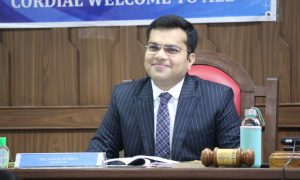Surabhi Singh is a graduate from National Law Institute University, Bhopal (Batch of 2014).She has an enviable academic record and has an excellent series of internships at top law firms. She has a noteworthy mooting and debating record.
With such a dynamic profile and her dedication to work, she bagged a job from AMSS in her 5th year of law school. Currently, she is working as an Associate there. We asked her to share her experiences and strategies she used over the years.
In this interview, Surabhi talks about:
- Importance of co-curricular activities
- Securing internships with top-notch law firms
- Appointment and work at AMSS
Tell us a bit about yourself. How would you like to introduce yourself ?
I graduated in April from NLIU Bhopal and am currently working at a law firm. To say more, honestly I spent the most time on this question. Not because I went into an introspection crisis as such questions put you in but I am generally a confused person constantly seeking this or that and mostly rejecting it. Without lauding myself for my confusion, I think aspiring lawyers/ smart individuals would and should identify with this.
What motivated you to choose law as a career?
When I was done with my Class X Board examination I wanted to be a doctor and today if I think about it I cannot point at why was that and why did I not think of law immediately? Mostly I think it was because I was a teen only focusing on doing well in my school exams and spending rest of my time wondering if I would ever look less ugly. So I am thankful to my father for adding some context to my chaos or lack of it and suggesting I study law. Fortunately I listened to him, read about it, liked it and sat for the entrance two years later.
I think Law is not as much about a taboo on the field itself but the lack of awareness on the options one can pursue after it. If that is repaired, by some way or the other, this should not be an issue.
 Tell us about your time at NLIU. Tell us about the highlights of your college life and your achievements?
Tell us about your time at NLIU. Tell us about the highlights of your college life and your achievements?
Life at NLIU throughout the five years was about learning, in the classroom, living on your own, participating in a group, the dos and donts of what to do before an exam night, like watching Breaking Bad before a jurisprudence exam will give you some wild ideas but maybe you should have slept instead. In short, NLIU gave me a certain kind of flexibility to live and read what I want and the privacy to do it.
I tried to do everything while I was in college, badly or otherwise, studying, mooting, debating, writing. In my first year I came across International Law and loved it and discovered its nuances, mooted and researched and realized the trials of those sleepless submissions. Later I went on to intern at different places, PSU, Courts, Corporate firms, attending competitions. I coudn’t pick a favourite to label it an achievement but I have in the last five years seen a lot and read a lot.
You have participated and won various moot court competitions. You have also won Best Speaker awards in few of these competitions. What is your advice to budding mooters?
I think there is this joy in arguing on something you have read a lot and reasoned it within the scope of the argument you must make. So an important prerequisite is that you read enough and everything that follows your line of argument. Factors such as access to resources, institutional support, luck also matter but mooting requires a strong dedication more than anything, and good coffee, from what I fondly remember.
If I had to advice in some words, I would say read and discuss, with everyone and anyone who might offer some perspective and make sure you know what you ultimately argue or write in a memo.
How does one make a winning memo? According to you, what is the difference between a great and an average memo?
A good memo is well drafted and well argued. It is lucid but well researched without sounding pedantic. Also much anguish goes into making it.
What are your thoughts on these activities like mooting, debating and publications in journals? How important do you think are these activities in shaping the legal career of a law student?
I have always felt that no amount of only doing one thing will make you wise enough to be sure of what you want to do at the end of law school or if that job at the top law firm is what you will want to do the rest of your life. Mooting, debating and other frolics might not be necessarily important for your CV for a job application but they will help you decide better and that is the smarter way to make any decision.
What are the tips and strategies you would like to share with our readers who are currently law students?
If I say I did okay in academics because I actually like studying and not because I intended to as much, I risk sounding ‘hippie’ but I will take that one. It helped that academics are not very rigorous and demanding unless you are aiming for medals, which is something I never had. I mean medals would have put a huge watt smile on my parents’ face and looked pretty on the wall but I never attached too much weightage to them. As far as strategy is concerned, it is definitely smarter to not fail, not get debarred, not let the average grade drop so you cant apply for that internship you always wanted to because it would be inconvenient to sit for the repeat and hunt for an internship. It might sound cliched but having a strategy helps a lot; fixing time to study for exams and then somehow managing to stick to it.
What skills have you acquired from your internships and how helpful have they been in your legal career?
What I learn from my internships was both in terms of working methods, knowledge and also how one manages to finish tasks in a social set up especially with large law firms, where there are hierarchies and work delegator and delegatee are often not in very close contact. What working and interning in a professional environment also teaches you is the importance of time and efficiency especially certain places that are so demanding that after working with them you would never send out an assignment before performing n number of checks proofing it. These things later on if you end up working with such a place help you adapt to it better.
You have been a member of multiple committees while in law school. Do you think these enhanced your skill-sets? Please share a few of your memorable experience.
Certainly! To begin with, in the initial years I would never have imagined asking someone to get something done, planning it and structuring it and executing it. Once as a part of a competition organized in college I was a part of the committee handling media and writing alive blog and I had some great fun updating it, following up with a set of people. And the perks of these things are that you may start speaking to people in college and appreciating skills you never thought they had.
You secured a job offer from AMSS in 5th year of law school. How did you go about this?
While I interned with AMSS for the first time I realized how large things are outside the class room and how law pans out differently in so many situations. So that made me sit for the placement rounds that happened in college. To ensure they would consider me for an interview I made sure I had enough work experience on my CV relevant to them, and their firm’s portfolio. So my internships were planned and applied for accordingly.
Tell us about the interview process and how did you prepare for it?
I had read everything thoroughly on my CV; made sure I knew the basic law behind it and understood the concepts. I also made sure I was prepared with contract law, procedure and some aspects of corporate law. I scanned the important legal and commercial developments thoroughly. The interview was quite smooth and I was not asked a lot of technical questions but I was fairly confident before it because somehow I knew i wouldn’t draw a blank at anything.
Many law students strongly believe that getting a job at one of the top law firms is mostly about securing a high GPA. Would you agree?
To the contrary, I think law firms look for well rounded students. I know friends and classmates who have made to some top tier firms because they were smart people who might not have the highest GPA but their grasp on concepts and their ideas helped them through. While there is a great chance that you will work for a good law firm ,sooner or later, you might not get to do that moot or organize that competition ever again, so its better to choose the latter.
If you could re-live your 5 years in Law school, is there something you would do differently?
No, not a thing.
Lastly, what would be your message for our readers?
Spend your time doing everything, and don’t regret it.
























